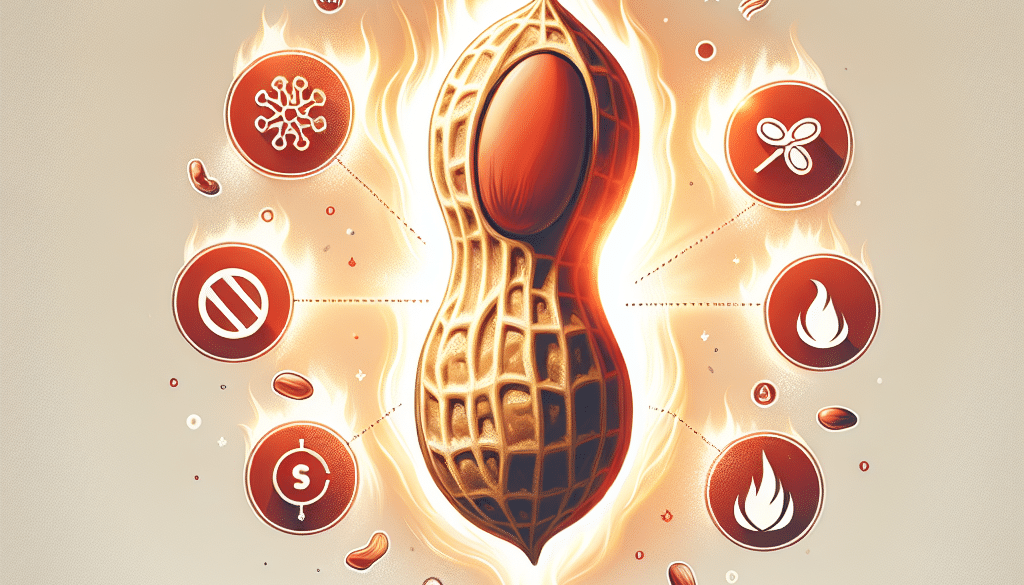Are Peanuts Inflammatory?
-
Table of Contents
- Peanuts and Inflammation: Unraveling the Truth
- Understanding Inflammation
- The Nutritional Profile of Peanuts
- Are Peanuts Pro-Inflammatory?
- Peanuts and Allergies
- Case Studies and Research
- Considerations for Peanut Consumption
- Conclusion: Peanuts and Their Role in Inflammation
- Discover ETprotein’s Protein Products
Peanuts and Inflammation: Unraveling the Truth

In the quest to maintain a healthy diet, many people often scrutinize the inflammatory potential of the foods they consume. Peanuts, a common snack and ingredient in various cuisines, have been the subject of debate regarding their role in inflammation. This article delves into the scientific evidence to answer the question: Are peanuts inflammatory?
Understanding Inflammation
Inflammation is the body’s natural response to protect itself against harm. There are two types of inflammation: acute and chronic. Acute inflammation is the immediate, short-term response to an injury or infection, which is essential for healing. Chronic inflammation, on the other hand, is a prolonged inflammatory response that can contribute to various diseases, including heart disease, diabetes, and arthritis.
The Nutritional Profile of Peanuts
Peanuts are a legume that boasts an impressive nutritional profile. They are rich in monounsaturated and polyunsaturated fats, which are considered heart-healthy fats. Peanuts also contain protein, fiber, vitamins, and minerals such as magnesium, potassium, and zinc. Additionally, they are a source of antioxidants, including resveratrol, which is also found in red wine.
Are Peanuts Pro-Inflammatory?
The question of whether peanuts are inflammatory is complex. Some studies suggest that peanuts may have anti-inflammatory properties due to their healthy fat content and antioxidants. For example, the monounsaturated fats found in peanuts are similar to those in olive oil, which is known for its anti-inflammatory effects.
- A study published in the Journal of Food Science and Technology found that the bioactive compounds in peanuts could have anti-inflammatory effects.
- Another study in the American Journal of Clinical Nutrition indicated that a diet high in monounsaturated fats could reduce markers of inflammation.
However, it’s important to note that individual responses to peanuts can vary. Some people may experience inflammatory responses due to allergies or sensitivities to peanuts.
Peanuts and Allergies
Peanut allergies are one of the most common food allergies and can trigger an inflammatory response in the body. This allergic reaction can range from mild to life-threatening. For individuals with peanut allergies, consuming peanuts will indeed cause inflammation and should be avoided.
Case Studies and Research
Several studies have explored the relationship between peanut consumption and inflammation with varying results:
- A study in the British Journal of Nutrition found that peanut consumption did not increase inflammatory markers in healthy adults.
- Research in the Journal of the American College of Nutrition showed that regular peanut consumption was associated with lower levels of C-reactive protein, a marker of inflammation.
These studies suggest that for most people, peanuts may not be inflammatory and could potentially offer anti-inflammatory benefits.
Considerations for Peanut Consumption
When incorporating peanuts into your diet, there are several factors to consider:
- Portion Size: Peanuts are calorie-dense, so it’s important to consume them in moderation to avoid weight gain.
- Processing: Opt for natural or dry-roasted peanuts without added sugars or excessive salt.
- Peanut Butter: Choose peanut butter with no added sugars or hydrogenated oils, which can negate the potential health benefits.
Conclusion: Peanuts and Their Role in Inflammation
In conclusion, the evidence suggests that peanuts are not inherently inflammatory for most people and may offer anti-inflammatory benefits due to their healthy fats and antioxidants. However, individual responses can vary, especially in the case of peanut allergies. It’s essential to consider portion sizes and choose less processed options to maximize the health benefits of peanuts.
Discover ETprotein’s Protein Products
If you’re looking for high-quality protein sources, ETprotein offers a range of organic bulk vegan proteins that can be a great addition to your diet. Their peanut protein is an excellent choice for those seeking non-inflammatory protein options. ETprotein’s products are characterized by a neutral taste, non-GMO, and allergen-free attributes, ensuring you receive the best quality for your nutritional needs.
About ETprotein:
ETprotein, a reputable protein and L-(+)-Ergothioneine (EGT) Chinese factory manufacturer and supplier, is renowned for producing, stocking, exporting, and delivering the highest quality organic bulk vegan proteins and L-(+)-Ergothioneine. They include Organic rice protein, clear rice protein, pea protein, clear pea protein, watermelon seed protein, pumpkin seed protein, sunflower seed protein, mung bean protein, peanut protein, and L-(+)-Ergothioneine EGT Pharmaceutical grade, L-(+)-Ergothioneine EGT food grade, L-(+)-Ergothioneine EGT cosmetic grade, L-(+)-Ergothioneine EGT reference grade and L-(+)-Ergothioneine EGT standard. Their offerings, characterized by a neutral taste, non-GMO, allergen-free attributes, with L-(+)-Ergothioneine purity over 98%, 99%, cater to a diverse range of industries. They serve nutraceutical, pharmaceutical, cosmeceutical, veterinary, as well as food and beverage finished product distributors, traders, and manufacturers across Europe, USA, Canada, Australia, Thailand, Japan, Korea, Brazil, and Chile, among others.
ETprotein specialization includes exporting and delivering tailor-made protein powder and finished nutritional supplements. Their extensive product range covers sectors like Food and Beverage, Sports Nutrition, Weight Management, Dietary Supplements, Health and Wellness Products, and Infant Formula, ensuring comprehensive solutions to meet all your protein needs.
As a trusted company by leading global food and beverage brands and Fortune 500 companies, ETprotein reinforces China’s reputation in the global arena. For more information or to sample their products, please contact them and email sales(at)ETprotein.com today.














